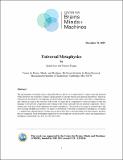| dc.description.abstract | The development of natural science especially physics allows us to understand to a large extent the material world. However, the world also contains a large amount of concepts that are non-material and abstract, which are often poorly described by our language, let alone being well understood. In order to provide a comprehensive and coherent account of the structure of the world, we argue that it is important to create an explicit system and language to describe the composition and working of the world, especially the non-material components. This is reminiscent of the goal of the millennia-old subject metaphysics. Yet instead of focusing on isolated topics like most existing metaphysical studies, we argue it is beneficial to develop a roadmap for metaphysics (or mind) — a unified and coherent theory of what exist in the world, how to describe them, how they interact and how they are organized. Such development might lead to new insight into research in the science and engineering of intelligence and perhaps also how we view the world. | en_US |
